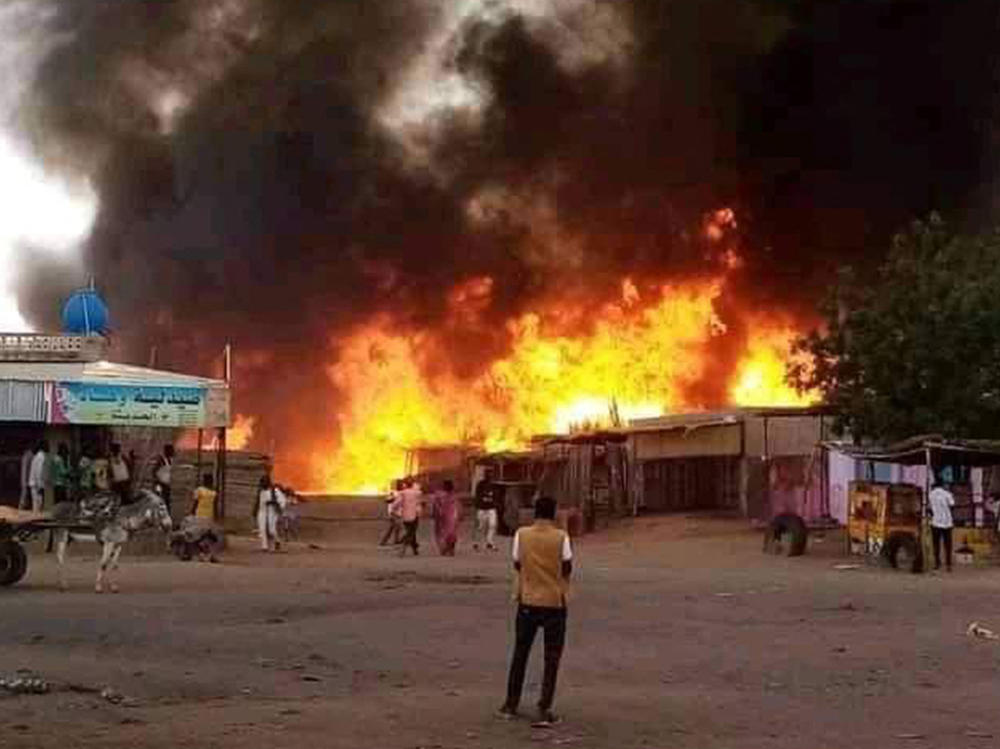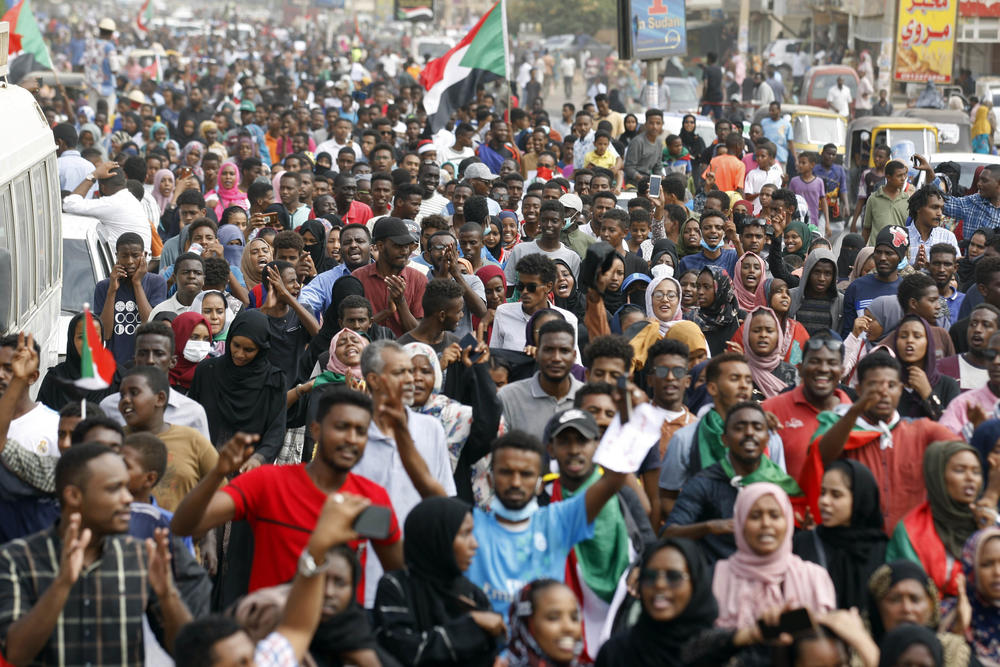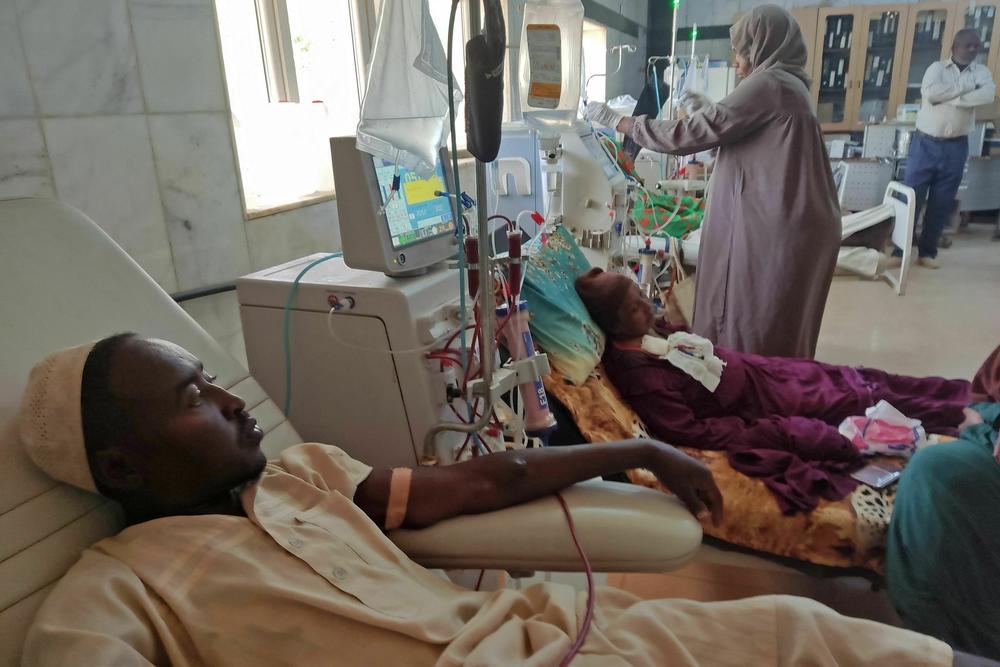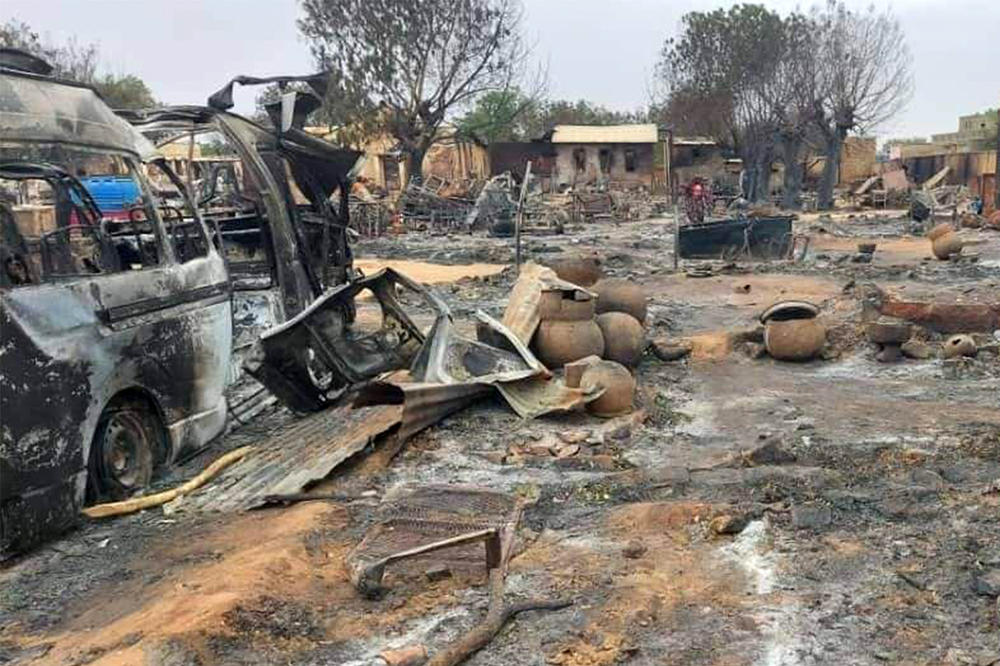Loading...
Section Branding
Header Content
Sudan's war passed 6 months, with much of the world consumed by other conflicts
Primary Content
JOHANNESBURG — The war between Sudan's military and a paramilitary group has entered its seventh month, causing nearly 190 days and nights of terror, loss and trauma for much of the northeast African country's population.
An estimated 9,000 people have been killed and another 5.6 million forced to flee their homes during the conflict, according to the United Nations.
"Half a year of war has plunged Sudan into one of the worst humanitarian nightmares in recent history," U.N. Undersecretary-General Martin Griffiths said in a statement.
NPR has been speaking to Sudanese people from different walks of life — doctors at a hospital, a young activist and a former governor — about how things have changed for them since fighting broke out in April between the Sudanese armed forces and the powerful paramilitary group, the Rapid Support Forces.
The activist
Thirty-year-old Duaa Tariq was among the grassroots activists who helped organize peaceful mass protests in 2019 largely in Khartoum, Sudan's capital, that brought down the decades-long dictatorship of former leader Omar al-Bashir — only to see a 2021 military coup derail her generation's dreams of democracy. This year's outbreak of conflict has dashed those hopes even further.
But Tariq, who has a huge curly mop of hair and a smile just as big, is uncowed. In April, she told NPR how she and fellow activists were continuing to resist the new conflict through small acts of disobedience, such as chanting revolutionary songs in the street between bombings or spray-painting political messages on walls.
Six months later, Tariq says graffiti protests on the street are simply too risky.
"In terms of resistance, resistance can take so many forms. ... There is not a chance for protesting physically on the street, even with graffiti, because the militia's occupying all the houses," she says. Tariq — who had a baby during the conflict — has herself been forced to move out of her home, which she says has been taken over by the militia and looted of "everything we have."
Still, Tariq and other activists have found different ways of resisting, setting up dozens of what they call "emergency response rooms" around Khartoum that she says do "all sort of humanitarian aid, mutual aid, psychosocial support. Now we have women's response rooms also, that deal with women's needs and stuff like sexual, like GBV [gender-based violence] stuff."
"When it comes to sexual violence and rape women are suffering a lot ... here's a lot of rape cases that were recorded and documented," she explains. "It's very dangerous to be out there and be a woman at this time in this dangerous war and this conflict zone because you always feel threatened and you're targeted."
Women from different ethnic communities have been especially targeted, she says. "There are women being raped in front of their families, women being raped constantly by the forces, and women are being taken — there's a few cases that women were taken from their houses. Yeah, so it's very dangerous for women right now and situation is only getting worse."
Children haven't fared much better, says Duaa.
"I see a lot of change in the children," she says. "They're very affected by the militarization of the area, and especially now the militia is distributing, like, toys to the children and they're giving food to people and stuff, people are afraid to not take it."
The doctors
The country's health system has been hit hard by the conflict, with many hospitals closed, a shortage of essential medicines and supplies, and doctors risking shelling — and their own lives — to attend to patients.
Ahmed Khojali works as an emergency officer in the neonatal ward of Khartoum's Albolouk Hospital, which he says is only functioning at about 60% capacity. He describes the six-month conflict as feeling like "a lifetime."
"Time," he says, "is totally frozen since the beginning of this war because I barely find any time to feel or think or be sorry about anything ... either sleeping or working."
He describes how what would have been routine days of seeing patients before the war are now punctuated by violence and near misses and how there's horror amid what used to be mundane.
"We were about to take a small rest at the office to take our breakfast and drink some tea with the lovely dessert brought from home that day, when suddenly a massive explosion struck the north yard of our hospital killing innocently one of the men standing there and rendering severely wounded others."
Dr. Amna Gasim also works at Albolouk Hospital, as a pediatric specialist. She says in the past few months, four shells have landed near her workplace, where many staff are practically living, unable to go home or see their families.
Her ability to treat her patients is hampered by a lack of resources.
"One of the most difficult stories is ... parents who bought their 12-year-old girl, who was their only child that came over eight years of infertility, the girl was diagnosed as kidney failure and needed urgent dialysis," she says.
Except that wasn't an option and the child died.
The former governor
In the brief, hopeful transitional period between the people-power revolution that toppled Bashir and the coup that installed the current government, Adeeb Yousif was the governor of Central Darfur state.
Yousif, who got his Ph.d. in conflict resolution at George Mason University in the United States, still lives in Darfur, and laments that most of the media focus on the war has been on the capital, to the neglect of other regions where conflict is raging.
"Darfur is in a very critical situation and ... people are suffering," he says. "I think things on the ground are getting worse."
In the early 2000s, Darfur become synonymous with genocide as an Arab militia known as the Janjaweed committed war crimes against non-Arab tribes in the region. The current paramilitary group fighting the military, the RSF, is an offshoot of the Janjaweed.
Yousif says the current violence once again has an ethnic component. "It's more of ethnic conflict rather than political conflict," he says.
Eric Reeves, a U.S. academic who has researched Sudan, echoed this in an email, saying the RSF is engaged "in what is unambiguously a genocidal campaign" against the Masalit people in the city of El Geneina in West Darfur.
"We are doing no better this time around in responding to the genocide that began in earnest in Darfur in 2003 — 'Never again!' ... again," he says.
Yousif says the humanitarian situation in his region is appalling because Darfur was already full of internally displaced people, to which new ones are now being added. On top of that, there's major food insecurity.
"Having in mind also that the rainy season this year is very little. The land that was cultivated this year is very limited and on top of that, there's insects, so that means the harvesting season will be so bad ... [and] result in the shortage of food."
"We can expect starvation in Darfur," he warns.
NPR's Emmanuel Akinwotu contributed reporting from Lagos, Nigeria.
Copyright 2023 NPR. To see more, visit https://www.npr.org.




